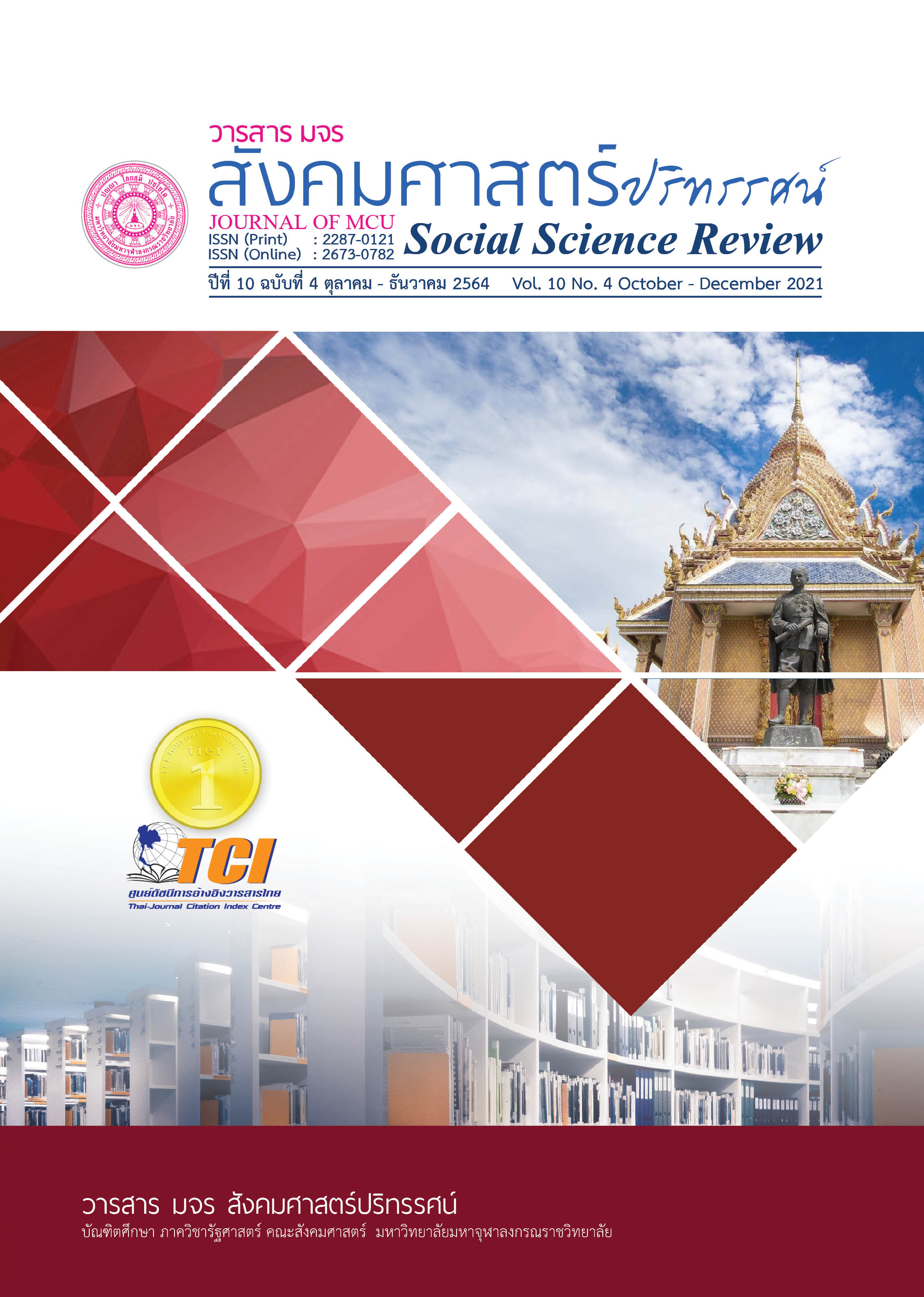การวิจัยเชิงประเมินผลกระทบของการทดสอบทางการศึกษาระดับชาติ ด้านพระพุทธศาสนา (B-NET)
คำสำคัญ:
การวิจัยเชิงประเมิน, ผลกระทบ, การทดสอบทางการศึกษาระดับชาติด้านพระพุทธศาสนาบทคัดย่อ
การวิจัยนี้มีวัตถุประสงค์เพื่อ (1) ประเมินผลกระทบของการทดสอบทางการศึกษาระดับชาติด้านพระพุทธศาสนา (B-NET) และ (2) จัดทำข้อเสนอแนะในการพัฒนาการทดสอบทางการศึกษาระดับชาติด้านพระพุทธศาสนาของโรงเรียนพระปริยัติธรรม แผนกสามัญศึกษา ใช้ระเบียบวิธีวิจัยเชิงประเมิน โดยการออกแบบวิจัยผสมผสานวิธีแบบพหุระยะ กลุ่มตัวอย่างเชิงคุณภาพ ประกอบด้วย ผู้เรียน 3 รูป ครูผู้สอน 3 รูป ผู้ทรงคุณวุฒิ จำนวน 6 รูป/คน ได้มาโดยการเลือกแบบเจาะจง กลุ่มตัวอย่างเชิงปริมาณ ประกอบด้วย ผู้เรียนที่เคยเข้ารับการทดสอบทางการศึกษาระดับชาติด้านพระพุทธศาสนา จำนวน 109 รูป ผู้บริหารสถานศึกษา จำนวน 104 รูป/คน และครูผู้สอน จำนวน 154 รูป/คน ได้มาโดยการเลือกแบบเจาะจง เครื่องมือที่ใช้ในการวิจัย ประกอบด้วย แบบสัมภาษณ์เชิงลึก แบบสอบถาม แบบบันทึกข้อมูลสนทนากลุ่ม การวิเคราะห์ข้อมูลเชิงปริมาณใช้สถิติเชิงบรรยาย การวิเคราะห์สหสัมพันธ์ การวิเคราะห์จำแนก และการวิเคราะห์ข้อมูลเชิงคุณภาพใช้การสร้างข้อสรุปแบบอุปนัย
ผลการวิจัยพบว่า 1. การทดสอบทางการศึกษาระดับชาติด้านพระพุทธศาสนาของโรงเรียนพระปริยัติธรรม พบว่า สร้างผลกระทบทั้งทางบวกและทางลบต่อผู้เรียน บุคลากรครู และผู้บริหารโรงเรียน 2. ข้อเสนอแนะในการพัฒนาการทดสอบทางการศึกษาระดับชาติด้านพระพุทธศาสนา มีประเด็นสำคัญดังนี้ (1) การนำผลสอบ B-NET ไปใช้ในการเข้าศึกษาต่อระดับมหาวิทยาลัย (2) การส่งเสริมและพัฒนาระบบประกันคุณภาพการศึกษาภายในให้เข้มแข็ง (3) การพัฒนาหลักสูตร การจัดการเรียนรู้ และการประเมินผล (4) กำหนดมาตรการสร้างแรงจูงใจในการสอบ B-NET และ (5) การพัฒนาบุคลากรครูและผู้บริหารโรงเรียนพระปริยัติธรรม
เอกสารอ้างอิง
กรมการศาสนา. (2542). การบริหารจัดการการศึกษา โรงเรียนพระปริยัติธรรมแผนกสามัญศึกษา. กรุงเทพฯ: การศาสนา.
จตุภูมิ เขตจัตุรัส และคณะ. (2562). รายงานวิจัยฉบับสมบูรณ์โครงการติดตามและประเมินผลกระทบของการประเมินผลการทดสอบทางการศึกษาระดับชาติ. กรุงเทพฯ: สถาบันทดสอบทางการศึกษาแห่งชาติ (องค์การมหาชน).
สถาบันทดสอบทางการศึกษาแห่งชาติ (องค์การมหาชน). (2562). รายงานประจำปี 2560. สืบค้น 9 กุมภาพันธ์ 2562, จาก http://www.niets.or.th
สัมพันธ์ พันธุ์พฤกษ์. (2561). การทดสอบทางการศึกษาระดับชาติในยุคปัจจุบันและอนาคตของไทย. ขอนแก่น: โรงพิมพ์มหาวิทยาลัยขอนแก่น.
สำนักงานคณะกรรมการการศึกษาขั้นพื้นฐาน. (2554). การติดตามตรวจสอบคุณภาพการศึกษา. กรุงเทพฯ: โรงพิมพ์ชุมนุมสหกรณ์การเกษตรแห่งประเทศไทย.
สำนักงานรับรองมาตรฐานและประเมินคุณภาพการศึกษา. (2562). ตัวบ่งชี้และเกณฑ์การประเมินคุณภาพภายนอกรอบสาม (พ.ศ.2554 – 2558) ระดับการศึกษาขั้นพื้นฐาน. สืบค้น 9 กุมภาพันธ์ 2562, จาก www.onesqa.or.th
เสดอาหมาด ศรียาน และคณะ. (2558). การนำผลการทดสอบทางการศึกษาระดับชาติด้านอสิลามศึกษา (I-NET) ไปใช้ในการพัฒนาคุณภาพผู้เรียน : กรณีศึกษาโรงเรียนเอกชนสอนศาสนาอิสลามในจังหวัดสตูล. กรุงเทพฯ: สถาบันทดสอบทางการศึกษาแห่งชาติ (องค์การมหาชน).
อิทธิพัทธ์ สุวทันพรกูล. (2556). การวิเคราะห์และสังเคราะห์กลยุทธ์การนำผลการทดสอบทาง การศึกษาระดับชาติขั้นพื้นฐานไปใช้ในการพัฒนาคุณภาพผู้เรียน: พหุกรณีศึกษาโรงเรียนที่มีผลการทดสอบทางการศึกษาในระดับดี. กรุงเทพฯ: สถาบันทดสอบทางการศึกษาแห่งชาติ (องค์การมหาชน).
American Educational Research Association, American Psychological Association, & National Council on Measurement in Education (Eds.). (2014). Standards for educational and psychological testing. American Educational Research Association.
Bamberger, M. (2012). Introduction to Mixed Methods in Impact Evaluation. Impact Evaluation Notes. No.3 August 2012. Retrieved March 20, 2020, from https://www.interaction.org
Creswell, J. W. (2013). Research Design: Qualitative, Quantitative, and Mixed Methods Approaches. (2nd edition). Thousand Oaks, CA: Sage publications.
Rogers, P. (2014). Overview of Impact Evaluation, Methodological Briefs: Impact Evaluation1, UNICEF Office of Research, Florence. Retrieved March 20, 2020, from https://www.unicef-irc.org/KM/IE/impact_1.php
The World Bank. (2004). Monitoring & Evaluation: Some Tools, Methods & Approaches. Washington, D.C.: The International Bank for Reconstruction and Development/ The World Bank.
ดาวน์โหลด
เผยแพร่แล้ว
รูปแบบการอ้างอิง
ฉบับ
ประเภทบทความ
สัญญาอนุญาต
ลิขสิทธิ์ (c) 2021 วารสาร มจร สังคมศาสตร์ปริทรรศน์

อนุญาตภายใต้เงื่อนไข Creative Commons Attribution-NonCommercial-NoDerivatives 4.0 International License.
เพื่อให้เป็นไปตามกฎหมายลิขสิทธิ์ ผู้นิพนธ์ทุกท่านต้องลงลายมือชื่อในแบบฟอร์มใบมอบลิขสิทธิ์บทความให้แก่วารสารฯ พร้อมกับบทความต้นฉบับที่ได้แก้ไขครั้งสุดท้าย นอกจากนี้ ผู้นิพนธ์ทุกท่านต้องยืนยันว่าบทความต้นฉบับที่ส่งมาตีพิมพ์นั้น ได้ส่งมาตีพิมพ์เฉพาะในวารสาร มจร สังคมศาสตร์ปริทรรศน์ เพียงแห่งเดียวเท่านั้น หากมีการใช้ภาพหรือตารางหรือเนื้อหาอื่นๆ ของผู้นิพนธ์อื่นที่ปรากฏในสิ่งตีพิมพ์อื่นมาแล้ว ผู้นิพนธ์ต้องขออนุญาตเจ้าของลิขสิทธิ์ก่อน พร้อมทั้งแสดงหนังสือที่ได้รับการยินยอมต่อบรรณาธิการ ก่อนที่บทความจะได้รับการตีพิมพ์ หากไม่เป็นไปตามข้อกำหนดเบื้องต้น ทางวารสารจะถอดบทความของท่านออกโดยไม่มีข้อยกเว้นใดๆ ทั้งสิ้น





